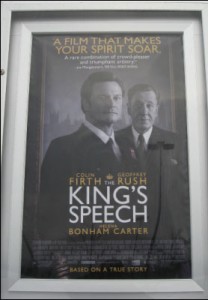Mandy Boyle
Advertising Sales Manager
If there is to be one word associated with the 2010 British historical drama, The King’s Speech, it’s “delightful.” Centered on the unlikely ascension of Prince Albert, Duke of York (later King George VI) to the throne in 1936, The King’s Speech is all at once intimate, entertaining, and inspiring.
The movie opens with Prince Albert, known affectionately as “Bertie” to his family, delivering an address at the 1925 Empire Exhibition with his wife Elizabeth, Duchess of York, at his side. Bertie stammers his way through the speech and one can’t help but feel uncomfortable. Both the prince and his audience are visibly unsettled by the address and as a result, Bertie withdraws from public life and begins seeing doctors and therapists to work on his speech. After a particularly embarrassing session where Bertie nearly chokes on marbles in a doctor’s office, he declares that he will no longer seek help for his stammer.
Elizabeth can’t let that happen, so she seeks out Lionel Logue, an Australian speech therapist living in London, known for his unorthodox and sometimes uncomfortable methods. Elizabeth is desperate and makes arrangements for Bertie to meet with Lionel.
The first meeting is awkward and unsettling for Bertie. Despite his royal status, Lionel treats him like any other patient. He can’t smoke, he’s called “Bertie”, and Lionel even bets him one shilling that he can make Bertie read without a stammer. Loud music, Shakespeare, and a recording ensue, causing Bertie to become irritable and flustered. He leaves Lionel’s office with the intention of quitting.

After his father’s Christmas address to the people, Bertie listens to the recording of himself reading in Lionel’s office. He’s convinced. Bertie begins daily coaching sessions with Lionel which take him outside his realm of comfort. Bertie is made to curse (in a hilarious scene), dance, stretch, jump, hop, roll, do vocal exercises, and delve into the painful psychology behind his problem. You will see happiness, anger, frustration, sadness, and friendship blossom in the process.
When George V dies, Bertie’s brother Edward assumes the throne, which he later abdicates in 1936 in order to be with American socialite Wallis Simpson. Suddenly, Bertie is put into a position he doesn’t want to be in and with this role, comes the uncomfortable reality of public speaking. Your heart will sink as Bertie is forced to become the one thing he dreads: king.
But can Lionel coach him through it? Can Bertie overcome the stammer to deliver one a powerful, unifying message to the people as war is declared on Nazi Germany? To find out, you’ll simply have to see the film.
In this reviewer’s opinion, Colin Firth’s portrayal of Prince Albert is nothing short of stunning. If he doesn’t get the Oscar for this role, it’ll be a great disappointment. One actually feels noticeably uncomfortable when the stammer begins to take over his abilities to communicate and overjoyed when he makes progress. Firth captures the nature of a speech impediment perfectly and one can’t help but cheer for him. His ever supportive and devoted wife Elizabeth, played lovingly by Helena Bonham Carter, stands by him even in the most difficult of circumstances surrounding his transformation.
Geoffrey Rush plays an incredibly likeable and graceful Lionel Logue, whom you can’t help but enjoy when he comes on screen. His presence is a comfort throughout the film, especially when Bertie struggles with both words and emotions. The friendship between the two men is heartwarming.
You’ll also notice something interesting with the cinematography throughout the film. Off-centered frames will eventually become centered as Bertie makes progress. Imbalances in the world become righted. Dull and rich colors fluctuate with Bertie’s moods and moments.
To put it simply, The King’s Speech is a beautiful film and its characters, superb acting, and story keep the viewer engaged from start to finish. You may find yourself wanting to see at least another hour of the film. I know I did.









